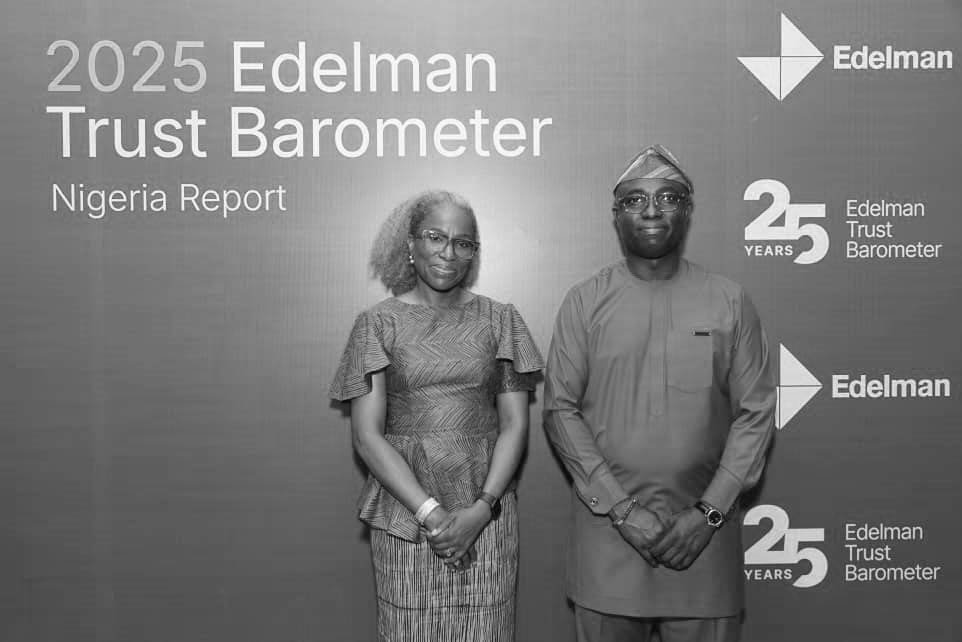Keeping up with headlines can prove to be a futile mission as they often shift fast, and brand love can dissolve with a single misstep. At the heart of this evolution is Kwame Senou, Regional Advisor for Edelman in West and Central Africa, and one of the continent’s sharpest minds on strategic communication. Whether it’s navigating the fragile terrain of post-colonial perception, decoding linguistic nuance, or leading conversations that cut across boardrooms and grassroots movements, Kwame understands that trust isn’t told; it’s earned.
In this conversation with GLAZIA, he breaks down what it takes to build brands that not only communicate effectively but also listen actively, respond thoughtfully, and lead with a clear sense of purpose. From the insights of the Edelman Trust Barometer to real-time lessons on cultural fluency and institutional credibility, he offers a masterclass on how African brands and global institutions can evolve without losing the very people they hope to serve.
Kwame Senou’s Take On Trust, Truth & Traction
GLAZIA: You’ve said “an organization’s ability to succeed or fail is defined by trust in their mission and leadership.” In the African context, where trust is often fragile, how can brands build and sustain it authentically?

Kwame Senou: Brands need to embrace the true meaning of communication, which is fundamentally a two-way exercise. Unfortunately, many are still stuck in a one-directional, information-dissemination mode, constantly pushing out messages rather than listening and engaging meaningfully with their audiences. Authentic communication must involve active listening and dialogue. From my experience, I have identified a recurring issue: many brands operate with concepts, products, or business models that are often alien to the African context. Take, for instance, the concept of investment, which inherently implies a return. Brands come in with visible investments, new infrastructure, campaigns, community engagements, but when it’s time for returns, they are met with distrust. This is often because local audiences don’t always connect the investments to the expected returns, creating a mismatch in perception and understanding. Trust breaks down not necessarily due to bad intent, but due to misalignment of expectations and inadequate explanation. Compounding this is the fact that many brands have not properly addressed past issues or criticisms. They either deflect, delay, or underinvest in long-term public relations strategies that would allow them to clarify their values and demonstrate accountability.
To address this, there must be a deliberate and strategic offer from brands to foster the two pillars of trust: competence and ethics. Competence answers the question: “Can they do it?” Ethics answers: “Will they do it in the right way?” Brands must go further to educate their audiences on what they are doing to uphold these pillars, why they operate the way they do, what values they uphold, and how they respond when things go wrong. Trust is not given; it must be earned continuously, especially in complex and historically sensitive environments.
G: As Regional Advisor for Edelman in West and Central Africa, how has the Edelman Trust Barometer reshaped the way multinationals and African brands approach public engagement and leadership accountability?
K.S: Our work as a global communications firm is fundamentally built on helping our clients earn the trust of their stakeholders through effective reputation management, commercial communications, and brand advocacy. Over the past 25 years, the Edelman Trust Barometer has been instrumental in studying and understanding how trust shapes society across government, media, business, and NGOs. This body of research doesn’t just highlight trends; it provides a roadmap for action.
We have learned that trust is the defining currency in the relationship between institutions and their stakeholders. It is trust that gives an organization its license to operate, its legitimacy to lead, and its capacity to grow. The Trust Barometer has shown that organizations cannot succeed without trust, and more importantly, they cannot recover from failure without it. In many African markets, where institutions face scrutiny and where skepticism can run deep, this insight is transformative.
For multinationals operating in Africa, the Barometer serves as both a mirror and a guide. For African brands, it presents an opportunity to lead with purpose and differentiate themselves based not only on price or product but on societal value and integrity.
G: What role does strategic communications play in bridging the trust gap between institutions and the public, especially in times of crisis or socio-political tension?
K.S: The 2025 Edelman Trust Barometer delivers a powerful message for Nigeria: the country’s trust index averaging trust across business, government, media, and NGOs, has increased to 65, up 4 points from the previous year. In an era dominated by skepticism, such an increase speaks to the resilience of institutions that have made a concerted effort to engage more transparently. But this is not a time for complacency.
Strategic communications is the most critical lever institutions can use to bridge the trust gap. When deployed effectively, it enables leadership to engage stakeholders, manage perceptions, and align actions with expectations. It’s not simply about issuing press releases or responding to criticism; it’s about understanding the deeper concerns of the public and proactively communicating values, intentions, and decisions in a way that resonates.
Crisis, by its nature, is unpredictable, but how organizations respond to crisis doesn’t have to be. Institutions that build robust communication frameworks in advance are better equipped to navigate socio-political tensions, reputational threats, and misinformation. Strategic communicators can help leadership prepare narratives, train spokespeople, and develop engagement models that respond with both competence and empathy.
In times of instability, strategic communications becomes the moral compass that helps institutions maintain clarity, project credibility, and ultimately preserve or rebuild trust. It reinforces the idea that institutions are not just accountable to shareholders but to all stakeholders, including citizens, employees, partners, and the broader public.
G: You operate at the intersection of Anglophone and Francophone markets. What are some of the unique communications challenges leaders face in navigating cultural and linguistic diversity while maintaining consistency in brand purpose?
K.S: Africa continues to be shaped by its post-colonial history, and one of its most enduring legacies is the linguistic and cultural divide between Anglophone and Francophone regions. These divides create additional layers of complexity for any brand trying to communicate with consistency and purpose across the continent.


